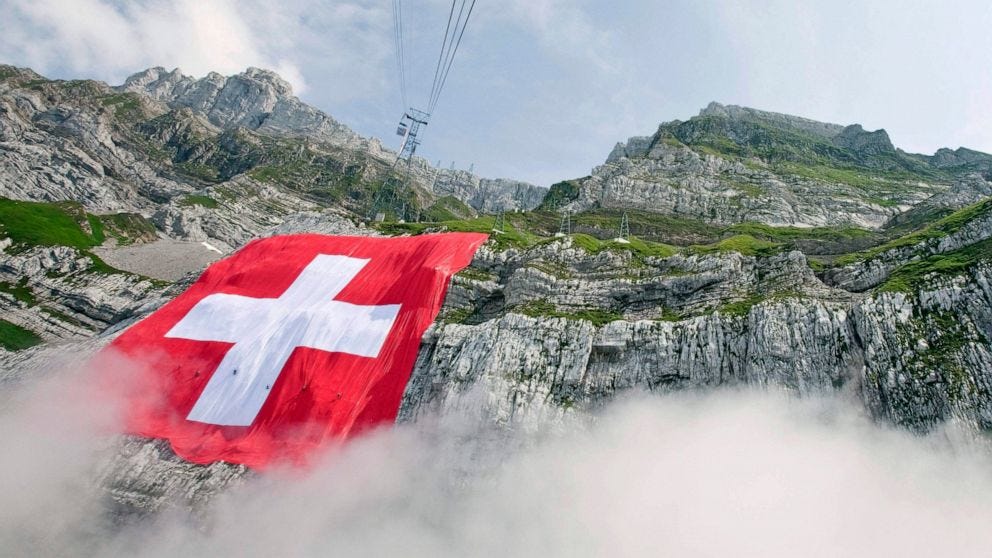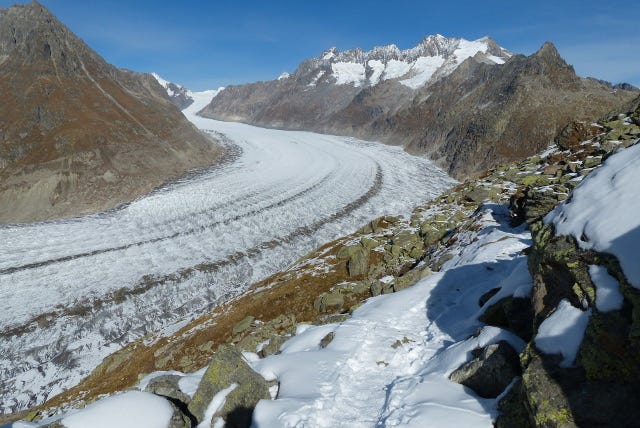Dear Insider,
The effects of last week's parliamentary elections are still being debated - and probably will be for some time. Prevailing opinions (and the results themselves) point to the new-found power of the Greens and the possibility that Switzerland could take a leading role in Europe's push into a sustainable future. But even with greater representation in the Nationalrat, there is no guarantee that policies will suddenly turn green. This is Switzerland, after all. Things move slowly.
This week we take a closer look at the green economy, its prophetess and future - as well as more on the UPC/Sunrise saga and its next chapter.
Glad to have you inside.

By the numbers
95 %
According to a Federal Government report, carbon emissions in buildings, transport and industry can be reduced by 95% using existing technologies.
4 000
There are approximately 4 000 glaciers scattered across the Alps - in Switzerland and surrounding countries. Based on a report by ETH University, 90% of them will disappear by 2100 if emissions are not drastically reduced.
5%
The immediate drop in Liberty Global's stock on NASDAQ after initial information of the failed deal for its UPC telco business to be acquired by Swiss carrier Sunrise.

The Aletsch glacier in Switzerland is steadily shrinking in size - as are most others.
Bring someone inside.
They will thank you.
Personal Profile - Regula Rytz

Who is the mastermind behind the green wave that swept through Swiss elections? Greta Thunberg? Not exactly... While the Swedish activist certainly raised awareness for climate change topics - in Switzerland and around the world - the main motor behind the electoral surprise of 2019 was Regula Rytz, president of the Green Party of Switzerland.
Here is her profile:
Born: 2 March 1962
Education: University of Bern (History, sociology and law)
Elected office: Member of the National Council since 2011
While Regula Rytz sweeps into the national spotlight on a "dynamic wave" of enthusiasm for green responsibility and bolstered by a 6,1% jump in the polls, fueled in large part by popular demonstrations from climate youth and others, the veteran politician is no stranger to the realities of doing business. She was General Secretary of the Swiss Federation of Trade Unions for 3 years and after which she also served on the city of Bern in several capacities including as a member of the commission for transport, civil engineering and urban green spaces.
As with many Swiss politician, Rytz portrays herself and her party as pragmatic despite high ideals. While Switzerland signed up to the Paris Climate Accord along with 194 other countries in 2016, some on the more hawkish side of parliament would have preferred to put climate on the back burner compared to other agenda items. Do not expect Rytz and the Greens to take to the streets themselves in order to twist the arms of Swiss industrialists, but there will be plenty of pressure to push the country to the forefront of the international community as a role model and motor for emissions control. Most of all, Rytz will seek to win a seat in the 7-person Bundesrat for her party and their allies.
QUOTE:
There's definitely a new dynamic. So far, the bourgeois parties have occupied themselves with their usual issues and cooperated with their well-known lobbies, the banks and insurance companies. Now, suddenly, a new force is coming into play that has a large voter mandate with regard to the climate.

The Briefing
In which we jump through some of the top stories from around the Swiss business world.
Dear Parliament, Would you please... - Business leaders also have their eyes on the newly-elected members of the Swiss parliament. In particular, CFOs - who answered a survey from Deloitte on their top priorities for the national assembly. The consensus? Swiss-EU relations, Social security reform and international trade relations. Somehow - not a surprise. (Read it in Handelszeitung.)
Up, up...and away? - The Swiss SMI index reached a new record high last week, touching in at 10 149,84. Whether the rise in stock prices is fueled by continued interest from investors who are desperate for growth away from cash-eating bank accounts at most large lenders is anyone's guess. The trend is, however, generally expected to continue. (Read it on Der Bund Wirtschaft)
More monthly money - Workers in Switzerland will rejoice, at least a little bit. According to projections published last week, a good number of Swiss employees can expect hike in wages of around 1,1% - with inflation figured in, that makes between 0,2 and 0,9% in real terms. Unfortunately, only about 30% of firms will implement a general increase across their entire staff. (Read it on 20 Minuten.)
Dead or alive... - It was supposedly done with - the deal that would send Liberty Global's UPC telco business to Switzerland's second-largest carrier Sunrise. Now...not surprisingly, there may be a resurrection. Certain provisions in the sale contract would allow Liberty Global to ask for another General Assembly of Sunrise shareholders - after last week's meeting was cancelled. Who knows how it will end. (Read it on NZZ.)
Rooftop revenue - Maximizing space has always been important in business. Now some of Switzerland’s major corporations, including SBB, Coop and Post are working overtime to add solar energy panels to their roofs. Panel construction is expected to double in the next 5 years. (Read it on Der Bund Wirtschaft.)
The Point - Will Swiss business go green?
Rarely has a so-called “force for good” garnered such dramatic success in so short a time.
Yes, as Green Party leader Regula Rytz will emphasise, this year’s electoral surge wasn’t an anomoly; its roots can be seen in previous polls as well. (And no, Greta shouldn’t get all the credit.)
But in a day and age where political parties are gaining traction more often because of strident language aimed at immigrants and imagined adversaries at home and abroad, to see a population offer such a clear call for positive change was refreshing.
Now comes the hard part.
How to reconcile the imperative for change with a demand for growth. This is - of course - the ultimate question. Thomas Jordan and his colleagues at the SNB have wielded their power to lower interest rates, to the detriment of some of Switzerland’s most powerful companies - the banks. This in the name of a weak(er) franc and a strong(er) export economy.
So policies to prop up growth are very much in style.
What about going green?
The Financial Times’s Simon Kuper argued recentlythat the concept of “green growth” does, in fact, not exist. Simply put, the hunger for growth, combined with financial and social stability, will tie the hands (and minds) of voters and their elected representatives alike.
Facts, unfortunately, would seem to back this up: Bloomberg reports that investment into renewable energy technology fell by 14% from last year.
Can Switzerland afford to be different?
On the surface maybe not. Under the burden of negative interest rates and buoyed by the SMI at an all-time high (see below), there won’t be much of an appetite to take any steps back.
The joker in the equation is the unique nature of Swiss politics. Whereas most other major, developed democracies operate in a polarized party system, divided more or less along the lines of left and right, Switzerland’s balancing act of a parliament and national cabinet, make it different.
In the dichotomy that is American or British or even German politics, the question usually boils down to “either - or”. Growth comes at the expense of emissions, responsible environmental policy at the expense of the wages, tax revenue and a booming economy.
Where the political class lives much closer (say in the shadow even) of the people themselves, as it does in Switzerland, there is more than one-sided pressure to make headway - and more than one outlet to offset “negative” effects of going more green.
Compromises won’t be easy and Rytz’s Greens will still lack a big enough body of representatives to single-highhandedly make things happen. But then again - no one ever does in Switzerland.
FT’s Kuper claims that democracy without carbon emissions (and industrial-age growth) cannot survive.
Switzerland just might prove him wrong.



